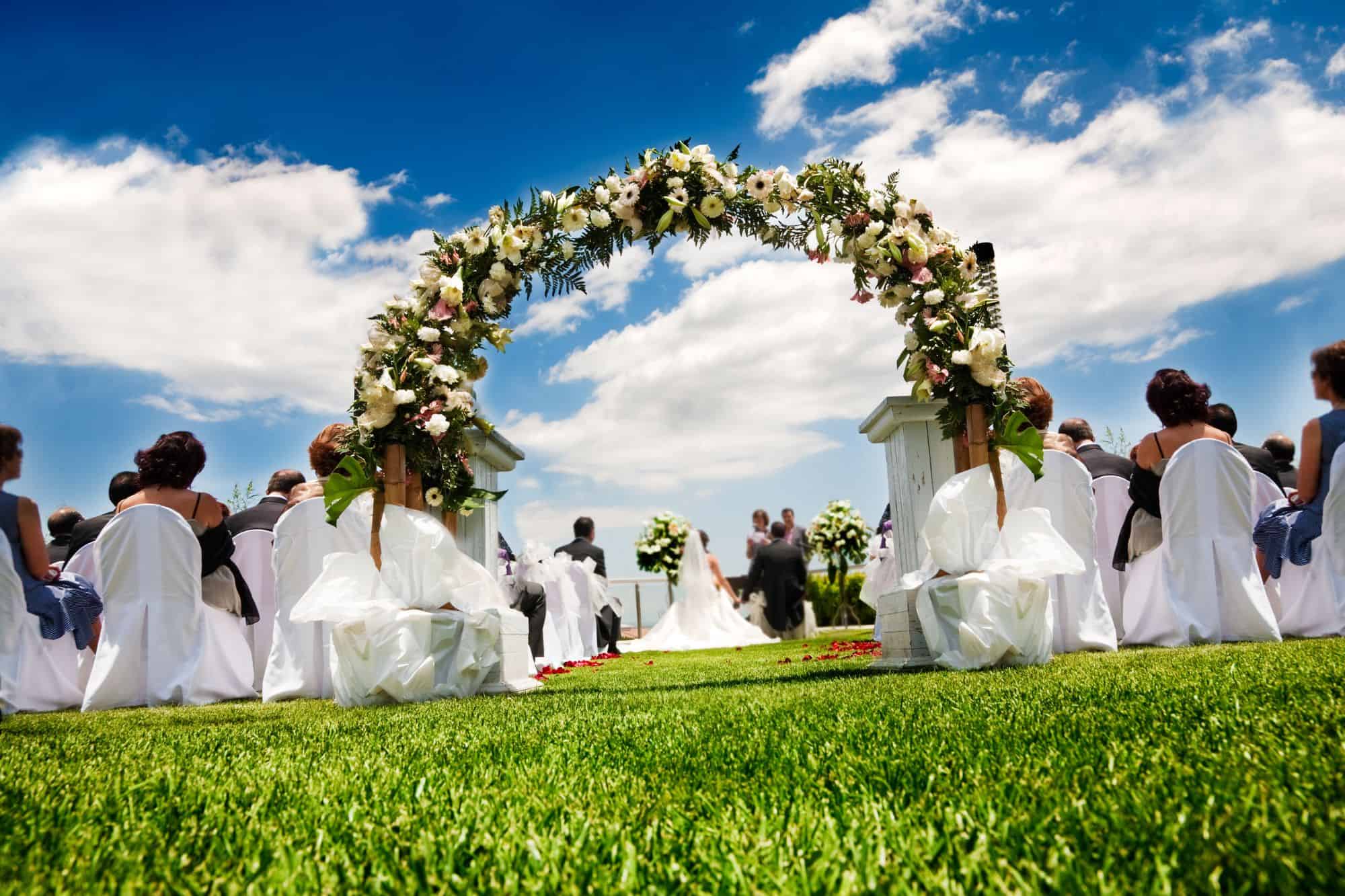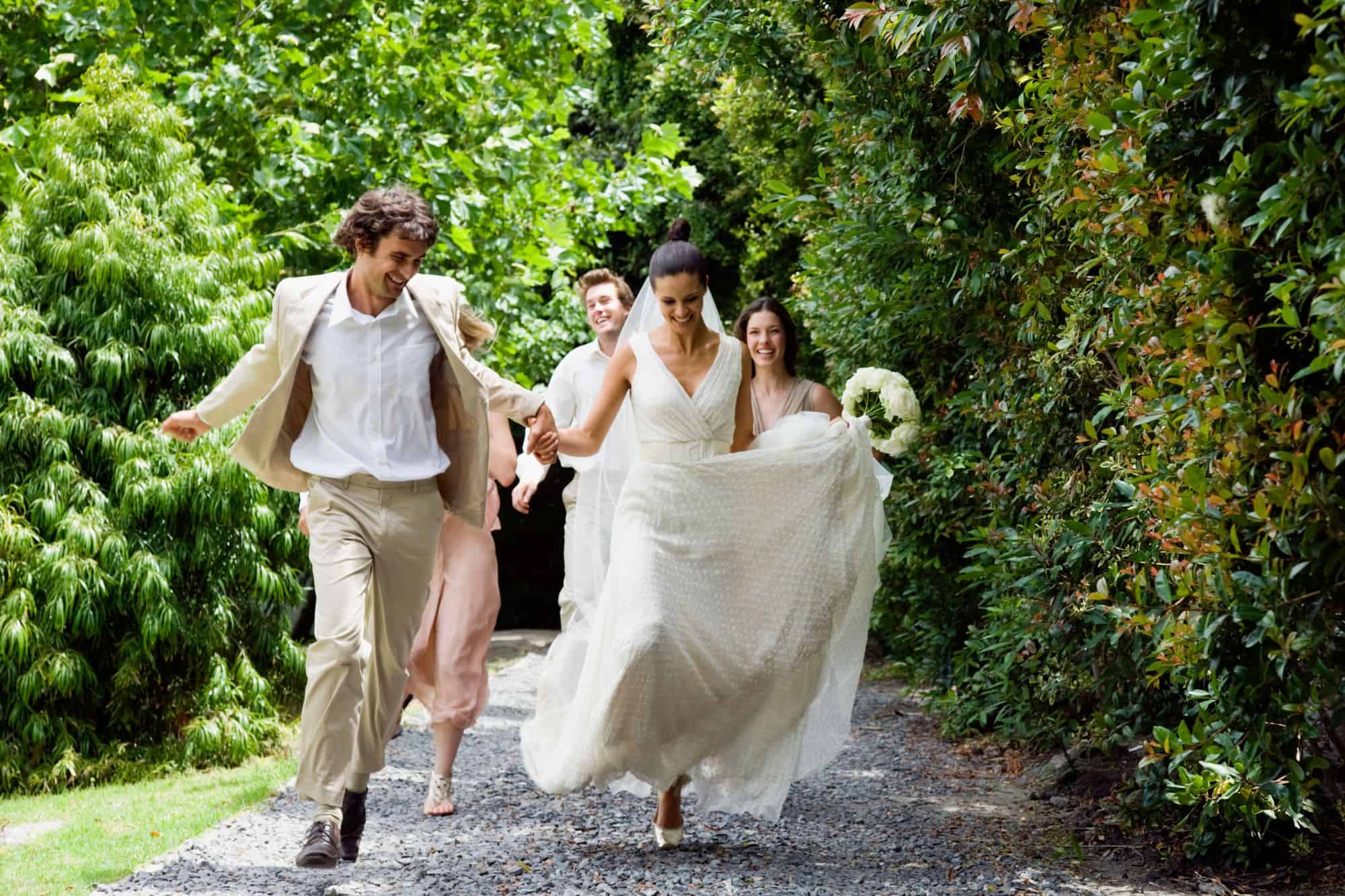Outdoor weddings provide a beautiful backdrop, but they also present significant challenges for sound quality.
Clear communication and music are essential to creating the perfect atmosphere.
To improve sound quality, it’s important to address specific issues such as wind, open space, and ambient noise.
Here’s how you can enhance the audio experience at your outdoor wedding venue.
Let’s get straight to the point
Improving sound quality at an outdoor wedding involves selecting weather-resistant, high-quality speakers, wind-resistant microphones, and amplifiers tailored for open spaces.
Conduct a venue acoustic assessment to identify sound challenges, position speakers strategically, and minimise wind noise.
Hiring a professional sound engineer ensures real-time adjustments and smooth audio. Incorporate modern technology like digital mixers and wireless systems, and conduct thorough sound checks before the event.
Prepare for weather changes by weatherproofing equipment and keeping backup gear handy for uninterrupted, high-quality sound throughout the ceremony.
1. Choosing The Right Sound Equipment For Outdoor Weddings
When it comes to outdoor weddings, the right sound equipment plays a critical role in creating a memorable experience. Outdoor venues are often open, and sound needs to travel farther and be clear in diverse conditions.
Carefully selecting equipment tailored to outdoor environments ensures both the couple and their guests can enjoy crystal-clear sound, whether for the ceremony, speeches, or background music.
Essential Equipment For Outdoor Weddings
The unique demands of outdoor weddings require specific audio gear that can handle the challenges of open spaces and unpredictable weather.
High-Quality Speakers
- Wide Dispersion Pattern: Choose speakers designed to cover large areas, ensuring sound is evenly distributed so that everyone in attendance can hear clearly.
- Weather-Resistant Models: Opt for speakers that can withstand outdoor elements such as rain, wind, and sun exposure, enhancing durability and reducing the need for last-minute replacements.
- Elevated Speaker Placement: Elevating speakers off the ground helps avoid obstacles like guests or furniture that might block sound projection.
Microphones
- Wind-Resistant Lapel Microphones: For the officiant and couple, wind-resistant lapel (clip-on) microphones are ideal. These allow for hands-free use and ensure vows and important moments are clearly heard by the audience.
- Wireless Microphones: Wireless systems reduce clutter from cables and provide flexibility in movement, especially in wide-open spaces.
- Handheld or Stand-Mounted Microphones: For speeches and toasts, these microphones offer convenience and reliability. They are also easier to pass around for multiple speakers.
Amplifiers And Mixers
- Amplifiers: Amplifiers are essential for boosting the sound output, ensuring that it travels across open, outdoor spaces without losing quality.
- Mixers: A mixer helps control multiple audio inputs, balancing sound levels for microphones, music tracks, and any live instruments. It ensures smooth transitions and clear sound from all sources.
Tips For Equipment Selection
Selecting the right gear goes beyond just choosing high-quality equipment. A few considerations can ensure your setup is reliable and performs well in outdoor settings.
Test For Clarity And Range
- Test the Equipment in Advance: Test your speakers and microphones to ensure they deliver clear sound over long distances without distortion or volume drop-offs.
- Range Check: Make sure wireless microphones have a strong, uninterrupted signal, even at the farthest points from the receiver.
Invest In Weatherproof Gear
- Weatherproofing: Outdoor conditions can change unexpectedly. Invest in equipment that is rated for outdoor use or has built-in protection from rain, wind, and heat.
- Backup Power Sources: Always have backup power options like generators or extra batteries in case of power issues at outdoor venues.
- Protective Covers and Stands: Use stands and covers for equipment to safeguard against dust, moisture, or accidental spills.
2. Conduct A Venue Acoustics Assessment
Before setting up, assess the venue’s natural acoustics to understand how sound travels through the space. Factors like trees, buildings, and water can all affect sound.
Factors To Consider
- Venue Size: Larger spaces require more powerful equipment or additional speakers.
- Natural Barriers: Trees and water can absorb or reflect sound, altering its quality.
- Weather Impact: Wind and humidity can affect how far and clearly sound travels.
Benefits Of An Acoustic Assessment
- Helps determine the best placement for speakers.
- Identifies problem areas where sound may be obstructed or lost.
- Provides insight into how weather conditions could affect sound on the day.
3. Strategic Speaker Placement
Positioning speakers correctly ensures even sound distribution without overwhelming guests. Outdoor environments allow sound to disperse easily, making careful placement essential.
Speaker Placement Strategies
- Frontal Placement: Position speakers at the front, slightly angled inward to direct sound towards the audience.
- Elevate Speakers: Place speakers on stands to allow sound to travel over guests’ heads.
- Use Delayed Speakers for Large Venues: In large venues, additional speakers placed further back ensure that all guests hear clearly.
- Consider Wind Direction: Place speakers to project sound with the wind, not against it, for clearer audio.
Benefits Of Strategic Placement
- Ensures consistent sound quality across the venue.
- Reduces the risk of dead zones where sound does not reach.
- Avoids overwhelming guests closest to the speakers.
4. Minimise Wind Noise
Wind is one of the biggest challenges for outdoor sound quality. It can cause unwanted noise in microphones and carry sound away from your audience.
Solutions To Combat Wind Noise
- Wind-Resistant Microphones: Use microphones with windshields or foam covers to minimise interference.
- Strategic Speaker Alignment: Position speakers with the wind, allowing sound to travel more smoothly.
- Barrier Setup: Use natural or artificial barriers (like hedges or tents) to shield the sound setup from strong winds.
Tips For Reducing Wind Noise
- Use wind-reducing accessories on all microphones.
- Place speakers on stable stands to prevent swaying in the wind.
5. Invest In A Professional Sound Engineer
Hiring a professional sound engineer can make a significant difference in the audio quality at your outdoor wedding. Their experience with sound in open spaces ensures smooth, professional-grade audio throughout the event.
Why Hire A Sound Engineer
- Real-Time Adjustments: A sound engineer can adjust audio levels throughout the ceremony to match changing conditions.
- Technical Expertise: They can troubleshoot issues like feedback, interference, or volume inconsistencies.
- Quality Assurance: Engineers ensure equipment is set up and functioning correctly before and during the event.
Benefits Of Professional Assistance
- Consistent, high-quality sound with minimal disruptions.
- Expert management of complex sound setups involving multiple audio sources.
6. Leverage Technology For Optimal Sound
Modern technology offers several tools to improve sound quality in outdoor settings. Digital mixers, sound processors, and wireless systems can provide enhanced control and flexibility.
Technological Tools To Enhance Outdoor Sound
- Digital Mixers: Allow for real-time adjustments to balance audio sources and improve sound clarity.
- Wireless Microphones: Provide flexibility without the need for cumbersome cables.
- Sound Processing Equipment: Devices like equalisers and compressors manage sound dynamics, keeping audio clear and consistent.
Tips For Using Technology
- Ensure all equipment is battery-operated or connected to a reliable power source.
- Use noise-cancelling technology to filter out ambient noise from the surrounding environment.
7. Conduct A Thorough Sound Check
A sound check is critical to catching any issues before the event begins. Test microphones, speakers, and amplifiers to ensure everything works as expected under real-world conditions.
Sound Check Checklist
- Test Microphones: Ensure all microphones are working and adjust sensitivity to reduce background noise.
- Monitor Speaker Output: Walk around the venue to check if sound reaches all guests.
- Adjust Volume Levels: Ensure that volume levels are appropriate for both speech and music without overwhelming or underwhelming the audience.
Benefits Of A Sound Check
- Identifies potential sound issues early, avoiding problems during the event.
- Allows for final adjustments to speaker placement or volume levels.
8. Weatherproof Your Setup
Outdoor weddings are vulnerable to weather changes, which can damage equipment and disrupt sound quality.
Being prepared for different weather conditions ensures your sound remains clear throughout the event.
Weatherproofing Techniques
- Use Weather-Resistant Equipment: Invest in weatherproof speakers, microphones, and covers.
- Have Backup Power Options: Battery-operated equipment or generators ensure that sound isn’t interrupted by power outages.
- Protect Electrical Connections: Ensure all connections are waterproof and safely protected from rain or moisture.
Importance Of Weatherproofing
- Prevents equipment failure during rain or extreme weather.
- Ensures uninterrupted sound regardless of weather changes.
9. Control Background Noise
Ambient noise from nature or distant activities can interfere with the clarity of sound at outdoor weddings.
Controlling background noise is essential to ensure speeches, vows, and music are heard.
Strategies To Minimise Ambient Noise
- Noise-Cancelling Technology: Use noise-cancelling microphones to reduce the impact of background noise.
- Directional Sound Control: Use speakers that direct sound towards the audience and away from potential noise sources.
- Use Barriers: Natural elements like hedges or artificial barriers can block external noise from affecting your setup.
Benefits Of Noise Control
- Keeps important moments clear and audible.
- Enhances the overall listening experience for guests.
10. Ensure Backup Equipment is Available
No matter how well you plan, technical issues can arise. Having backup equipment on hand ensures that sound quality is not compromised in case of malfunction.
Backup Essentials
- Spare Microphones: Keep extra microphones on hand in case of technical failure.
- Backup Speakers: Additional speakers can replace faulty ones or reinforce sound if needed.
- Extra Cables and Batteries: Always have extra cables and batteries to ensure continuous operation.
Importance Of Backup Gear
- Reduces the risk of equipment failure affecting the event.
- Ensures consistent sound quality even in the event of technical issues.
Conclusion
Outdoor weddings provide an enchanting setting, but ensuring clear sound requires careful planning, the right equipment, and expert execution.
From selecting the right sound gear to placing speakers strategically and hiring a professional sound engineer, each step plays an essential role in overcoming the acoustic challenges of an outdoor venue.
By addressing potential problems such as wind and background noise, and by leveraging technology, couples can create an immersive and beautiful sound experience that complements the visual splendour of their wedding.
With the right approach, your outdoor wedding will sound just as beautiful as it looks.
Frequently Asked Questions
What’s The Best Type Of Sound Equipment For An Outdoor Wedding?
For outdoor weddings, it’s crucial to use high-quality, weather-resistant speakers that can project clear sound across open spaces.
Directional speakers are particularly effective as they focus sound precisely where needed, minimising loss to the surroundings.
Wireless microphones are also recommended for their flexibility and to reduce cable clutter around the venue.
How Can We Deal With Wind Noise Affecting The Sound Quality?
Wind noise can significantly impact sound quality. To mitigate this, use microphones with windshields or screens, and consider placing physical barriers or using the natural landscape to block or diffuse wind.
Additionally, adjusting the microphone’s position and using directional microphones can help reduce the intrusion of wind noise.
Where Should Speakers Be Placed For The Best Sound Distribution?
Speaker placement is key to achieving even sound distribution. Rather than relying on a few loudspeakers, use multiple speakers strategically around the venue at ear level.
This helps create a consistent volume level and clarity across the area. Angling speakers slightly downwards can also direct sound more effectively to where your guests are seated.
Is It Worth Hiring A Professional Audio Technician For Our Outdoor Wedding?
Absolutely. A professional audio technician can manage sound levels dynamically, adapting to changes during the event and ensuring consistent sound quality.
They’re also invaluable for troubleshooting any unexpected audio issues, allowing you to focus on enjoying your special day without worrying about the technical details.
What Should We Do To Ensure Our Vows And Speeches Are Heard Clearly By All Guests?
To ensure that every word is heard, consider using lapel microphones for the officiant and anyone speaking during the ceremony. Conduct a thorough sound check before the event to adjust volume levels and eliminate feedback or background noise.
Educating speakers on how to use microphones effectively can also improve sound clarity. Additionally, positioning speakers to cover the seating area evenly will help ensure all guests can hear the proceedings.



